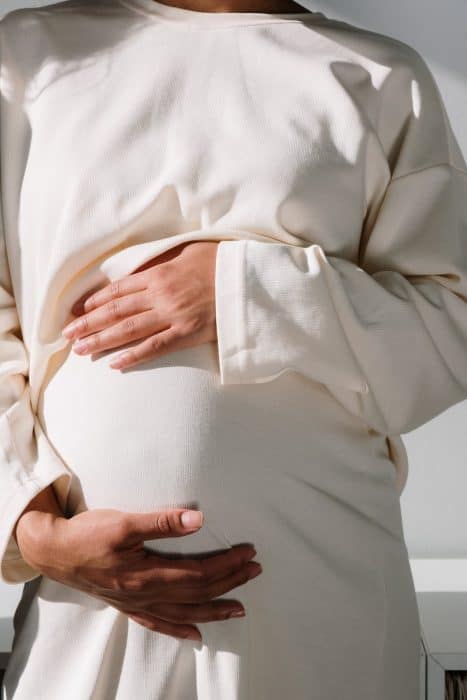Is That Tiny Miracle on the Way? Early Signs of Pregnancy
Early Signs of Pregnancy
Have you ever had that feeling deep inside that something wonderful might be on the horizon? Perhaps, at this moment, a little bundle of joy is secretly planning to enter your life. Many soon-to-be parents have experienced this hopeful sensation.
The road to pregnancy begins long before the positive test result, and your body may be dropping hints, like a sweet secret between you and your future child.
So, here’s the big question: could you be pregnant? The answer lies in the pregnancy test, of course, but even before you miss a period, your body has a story to tell.
Early Signs of Pregnancy
It’s a story of new beginnings, tender moments, and incredible changes happening within you. Join us as we explore the very first signs and symptoms of pregnancy as if your little one is trying to say, “Surprise, I’m on my way!”
These early signs are like nature’s clues, gently nudging you towards the enchanting path of parenthood. They may be subtle, but they carry the weight of dreams and hopes.
Join us on this journey as we decode your body’s language and uncover why these signs happen. Because there’s truly nothing like that moment when you realise your life is about to change in the most beautiful way imaginable.

When Do Pregnancy Symptoms Begin? The Gentle Start to an Incredible Journey
When it comes to the journey of pregnancy, it’s like nature’s little secret that unfolds uniquely for each woman. You see, pregnancy symptoms don’t come knocking on everyone’s door at the same time, and sometimes, they tiptoe in so softly that you might not even notice.
Just like the path to parenthood, the way your body signals the presence of a little one is a beautifully individual story.
Imagine this: on an average 28-day menstrual cycle, the tale begins about 14 days after your last period when conception takes place. That’s the moment when the miracle begins, but it’s often a quiet start.
Around 17 days after your last period, some women might start to notice subtle signs like heightened sensitivity to smells, tender breasts, fatigue, or a slightly elevated basal body temperature. These early hints are like your body’s way of saying, “There’s something special happening here.”
As you move forward, between days 20 to 26 after your last period, you might experience implantation bleeding, and your cervical mucus might become a bit thicker. It’s as if your body is preparing for the wonderful journey ahead, but it’s a gentle, almost secret preparation.
Between days 28 to 35 after your last period, more noticeable changes might occur. Frequent urination and mood swings may make their debut, and this is often around the time you might miss your period. But remember, every woman’s story is different, and some may not experience these symptoms until later or at all.
For those with longer cycles, like 35 or more days, other pregnancy symptoms might begin sometime during the first trimester. It’s a reminder that every pregnancy is its own unique adventure.
The most common sign of early pregnancy is a missed period. But here’s the thing: for some women with irregular cycles or those using certain types of contraception, a missed period might not be the first clue. It’s like pregnancy has its own special way of announcing itself, tailored just for you.
So, as you embark on this incredible journey, remember that it’s your own story, and these early signs are the whispers of a new chapter. Embrace them, for they are the first sweet notes of the symphony that is parenthood, and they remind us that the path to a joyful surprise is as individual and beautiful as you are.
Before the Missed Period: Weeks 2-4 of Pregnancy
Raised Basal Body Temperature
Have you ever wondered if your morning thermometer could spill the beans on your pregnancy before anyone else does?
Here’s a cool tidbit about tracking your journey to parenthood: when you conceive, your first morning temperature, measured with a special basal body thermometer, tends to rise by about 1 degree. And guess what? It stays elevated throughout your pregnancy.
Now, it’s not a guaranteed sign of pregnancy, but it could be a little clue that something exciting is happening there. So keep an eye on that thermometer – it might just have some early news about your little one!
Smell Sensitivity
If you’ve noticed your sense of smell going into overdrive and even the mildest scents becoming too strong or unpleasant, it could be a sign of early pregnancy. Many women report this as one of their first pregnancy symptoms, so keep an eye on your sense of smell – there might be a little bundle of joy on the way!
Breast Changes
Wondering what’s up with your breasts lately? Well, here’s the scoop for all you soon-to-be parents! Your breasts might be going through some changes early in pregnancy. They can become tender and swell up a bit. Plus, those circles around your nipples, called areolas, may get darker and slightly bumpy.
Don’t blame your body; it’s all thanks to the tag team of hormones called oestrogen and progesterone. They’re getting everything ready for the milk-making marathon when your little one arrives.
Speaking of those bumps on your areolas, they’re called Montgomery’s tubercles, and they’re like your personal nipple lubrication squad, gearing up for baby’s feeding time. So, it’s all part of the exciting journey to parenthood and also a sign that you might be expecting a baby!
Fatigue
Have you ever felt like you’re hiking up a mountain, carrying a backpack that gets a little heavier every day? Well, that’s a lot like pregnancy! In a nutshell, it’s hard work, and one of the early signs is feeling seriously tired.
See, when you become pregnant, your body kicks into high gear to build a special life-support system called the placenta for your little one. All that hard work can leave you feeling like you need extra naps. So, if you’re suddenly nodding off during the day, don’t worry – it’s just your body’s way of getting ready for the amazing journey ahead!
Implantation bleeding
Have you ever heard about a sneak peek from your body before the big pregnancy reveal? Well, here it is: implantation bleeding. Imagine a light spotting, like a hint from your uterus, that happens about six to 12 days after conception.
Now, here’s the hard part: How do you know it’s not just your regular period? Well, implantation bleeding is usually a gentle pink or light brown, not that bold period-red. It’s more like little specks, not a full flow, and it doesn’t stick around for long – just a few hours to a couple of days.
But wait, there’s a twist! Sometimes, spotting can play tricks on you, especially if your cycle likes to keep you guessing. So, if you notice this subtle sign, it could be your body giving you a pregnancy wink!
Changes in cervical mucus
Hey, soon-to-be parents! Here’s a secret code your body might be sending: check out your cervical mucus. If it turns all creamy and stays that way after you’ve ovulated, it could be a sign that a positive pregnancy test is in your future.
But that’s not all! As your pregnancy journey continues, you might notice something called leukorrhea. It’s just a fancy name for increased vaginal discharge, and it’s thin and milky-white, totally normal and healthy.
However, if it starts looking lumpy or thick, it’s time to have a chat with your doctor. Your body has some interesting ways of keeping you on your toes during this adventure!
Frequent Urination
Ever felt like you’re suddenly BFFs with your bathroom? Here’s the scoop: about two to three weeks after that special moment of conception, you might notice something interesting – the sudden urge to pee more often.
Blame it on the pregnancy hormone hCG; it’s like the traffic cop for your kidneys, helping them work extra efficiently to clear out waste, not just for you but for your growing baby, too.
But wait, there’s more! Your ever-expanding uterus is also playing a role. It’s starting to nudge your bladder, leaving less room for pee storage. So, if you’re making more trips to the bathroom, it’s all part of the pregnancy adventure!
Mood Swings
Hey, future parents, have you ever felt like your emotions are on a rollercoaster ride? Well, let’s talk about mood swings during pregnancy!
Blame it on those pesky pregnancy hormones. As early as 4 weeks into the pregnancy, you might start feeling a bit like you’re in PMS mode. And as your journey continues, your mood can be as unpredictable as the weather.
But here’s the thing: it’s all part of the adventure. Your life is about to change in a big way, and your hormones are just catching up. So, be kind to yourself, eat well, get some good sleep, and don’t forget to pamper yourself along the way. You’ve got this!
Journey Through Pregnancy: Weeks 4-9 After a Missed Period
Missed Period
Hey there, soon-to-be parents! Let’s talk about the one big hint: a missed period.
If your periods are usually as reliable as your morning coffee, and suddenly you’ve missed one, it’s like a flashing neon sign that says, “Hey, something’s up!”
It’s one of those early pregnancy clues that pretty much all expectant moms notice. So, if your period decides to play hide-and-seek, it’s time to consider the possibility that you might have a little one on the way!
Bloating
Have you ever had those moments when your jeans suddenly feel like they’ve shrunk in the wash? Well, here’s the scoop on early pregnancy bloating!
It’s a little change you have when you’re pregnant, and it can be hard to tell from regular pre-period bloating. But here’s the twist: it’s actually an early sign of pregnancy that many women experience soon after conceiving.
So, why the sudden puffiness? Meet the hormone progesterone. It’s the culprit behind this bloating sensation. It slows down digestion, which means the nutrients from your food get more time to nourish your baby-to-be.
Now, here’s the not-so-fun part – bloating often brings along its friend, constipation. But don’t worry, a good dose of fibre in your diet can help keep things moving smoothly.
So, if your tummy feels like it’s playing tricks on you, just remember, it’s all part of the exciting pregnancy journey!
Heartburn and Indigestion
Hey there, expectant parents! Let’s talk about a not-so-friendly visitor during pregnancy: heartburn.
Around the second month of pregnancy, some moms-to-be start feeling the burn. No, not from spicy food, but from the hormones called progesterone and relaxin. These sneaky hormones relax the muscles in your body, including those in your stomach and intestines. This slowdown in muscle action can make food take a leisurely stroll through your digestive system, leading to that fiery sensation.
Now, here’s a little tip: popping some sugarless gum might offer some relief. It helps to increase saliva production, which can in turn ease heartburn. But remember, if it gets really bothersome, talk to your doctor. They might have some safe medications to recommend.
So, while heartburn may be an unwelcome guest, there are ways to keep it in check during this exciting journey to parenthood!
Morning Sickness or Nausea
Hey there, parents-to-be! Let’s dive into the world of “morning” sickness – though, spoiler alert, it doesn’t always stick to mornings!
Around week 6 of pregnancy (sometimes even earlier), you might start feeling queasy. Now, don’t be fooled by the name; this “morning” sickness can show up any time of day. For most women, it begins around week 9.
So, what’s the culprit behind this nauseous sensation? Blame it on the hormones, especially progesterone, though oestrogen and hCG play a part too. These hormones can slow down your stomach’s emptying process, making you feel a bit like you’re on a rocky boat – think of it as seasickness on land!
But don’t worry, it’s a sign that your body’s doing its pregnancy thing. And while it might not be the most pleasant part of the journey, there are ways to manage it. So, hang in there!
Food Aversions
Hey there, soon-to-be parents! Let’s talk about a little quirk that might show up early in your pregnancy journey: food aversions.
You know how sometimes even the thought of certain foods makes you go “ick”? Well, that’s what we’re talking about. Your normally favourite foods might suddenly seem unpalatable.
Whether it’s chicken or something as innocent as salad, these food aversions can be triggered by the smallest things. Blame it on those pesky pregnancy hormones, especially in the early days when your body’s adjusting to all the changes.
The good news? This sensitivity to certain foods tends to ease up as you move into the second trimester when your body starts to settle down. So, if you find yourself saying “no” to foods you usually love, don’t worry – it’s just a temporary twist in your pregnancy adventure!
Excessive Saliva
Hey there, expectant parents! Have you ever noticed your mouth getting extra watery in the early stages of pregnancy? It’s called ptyalism gravidarum. This saliva overload typically kicks in during the first trimester.
Why? Well, think of it as your body’s way of protecting your mouth, teeth, and throat from stomach acid. So, while it might seem a bit odd, it’s all part of your body’s pregnancy plan to keep things in check.
Pregnancy or PMS? Spotting the Early Signs
Hey there, soon-to-be parents! Have you ever wondered if those early signs you’re feeling are pointing to pregnancy or just PMS playing tricks on you?
Here’s the scoop: Many early pregnancy symptoms are like secret twins of PMS symptoms. But there are a couple of pregnancy-exclusive clues to watch for. If your areolas (those circles around your nipples) suddenly look darker, wider, and bumpy, that’s a hint you might be pregnant. A consistently high Basal Body Temperature (BBT) and creamy vaginal discharge post-ovulation can also signal pregnancy, but they’re not 100% foolproof.
For all the other early signs like nausea, tender breasts, fatigue, bloating, and super smell sensitivity, there’s no surefire way to tell. The ultimate detective? A pregnancy test.
So, while it might feel like a game of “Pregnancy or PMS,” just hang tight until you can take that test. It’s the true reveal of this exciting journey!
When to Take a Home Pregnancy Test?
Hey there, future parents! So, you’re eager to find out if you’re expecting, right? Well, here’s the lowdown on when to take that home pregnancy test.
Most women have to hold back for about two weeks after ovulation before taking a pregnancy test. These tests actually measure a hormone called human chorionic gonadotropin (hCG) in your urine.
It’s the special hormone produced by your placenta, and it starts showing up in your urine shortly after an embryo implants in your uterus, which happens around six to 12 days after fertilisation.
Now, here’s the timing trick: hCG levels usually need a little time to build up, and they’re not typically high enough for a home test until your period is expected.
If you just can’t wait, some home pregnancy tests claim 60 to 75 per cent accuracy four to five days before your expected period. But if patience is your game, waiting until your period day boosts the accuracy to a whopping 90 per cent, and just one more week bumps it up to 99 percent.
Remember, false negatives are more common than false positives, so if your period skips town without notice, it’s time to talk to your healthcare provider. They’ll likely do a blood test to confirm your pregnancy status.
No matter what symptoms you’re having, the real deal confirmation comes from a visit to your OB/GYN. Schedule that first prenatal visit early to ensure you get top-notch care right from the start.
And if you’re indeed expecting congrats! You’re embarking on an incredible journey!
This article is meant as general information, always consult your medical professional for advice. If in doubt, always consult your doctor.
For other great articles see here



